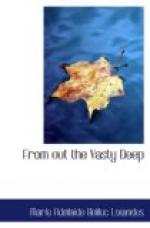Blanche Farrow was secretly amused to note with what zest her friend threw himself into the role of country squire. She thought it a trifle absurd, the more so that, as a matter of fact, the people of Wyndfell Green were not his tenants, for he had only a life interest in the house itself. But Varick was determined to have a good, old-fashioned country Christmas; and he was seconded in his desire not only by Bubbles, but by Helen Brabazon, who entered into everything with an almost childish eagerness. Indeed, the doings on Christmas Day brought her and Bubbles together, too. They began calling each other by their Christian names, and soon the simple-minded heiress became as if bewitched by the other girl.
“She’s a wonderful creature,” she confided to that same wonderful girl’s aunt. “I’ve never known anyone in the least like Bubbles! At first I confess I thought her very odd—she almost repelled me. But now I can see what a kind, good heart she has, and I do hope she’ll let me be her friend.”
“I think you would be a very good friend for Bubbles,” answered Blanche pleasantly. “You’re quite right as to one thing, Miss Brabazon—she has a very kind, warm heart. She loves to give people pleasure. She’s quite delightful with children.”
The speaker felt that it would indeed be a good thing if Bubbles could attach herself to such a simple yet sensible friend as was this enormously rich girl. “And if you really like Bubbles,” went on Blanche Farrow deliberately, “then I should like just to tell you one or two things about her.”
Helen became all eager, pleased attention. “Yes?” she exclaimed. “I wish you would! Bubbles interests me more than anyone I ever met.”
“I want to tell you that I and Bubbles’ father very much regret her going in for all that—that occultism, I believe it’s called.”
“But you and Mr. Varick both think it’s only thought-reading,” said Helen quickly.
Blanche felt rather surprised. It was acute and clever of the girl to have said that. But no doubt Miss Burnaby had repeated their conversation.
“Yes; I personally think it’s only thought-reading. Still, it’s thought-reading carried very far. The kind of power Bubbles showed the night before last seems to me partly hypnotic, and that’s why I disapprove of it so strongly.”
“I agree,” said Helen thoughtfully. “It was much more than ordinary thought-reading. And I suppose that it’s true that she thought she saw the—the spirits she described so wonderfully?”
“I doubt if even she thought she actually saw them. I think she only perceived each image in the mind of the person to whom she was speaking.”
“I suppose,” asked Helen hesitatingly, “that you haven’t the slightest belief in ghosts, Miss Farrow?”
“No, I haven’t the slightest belief in ghosts,” Blanche smiled. “But I do believe that if a person thinks sufficiently hard about it, he or she can almost evolve the figure of a ghost. I think that’s what happened to my maid the other night. Pegler’s a most sensible person, yet she’s quite convinced that she saw the ghost of the woman who is believed to have killed her little stepson in the room next to that in which I am now sleeping.”




